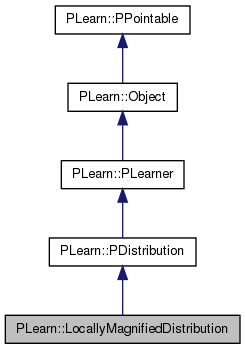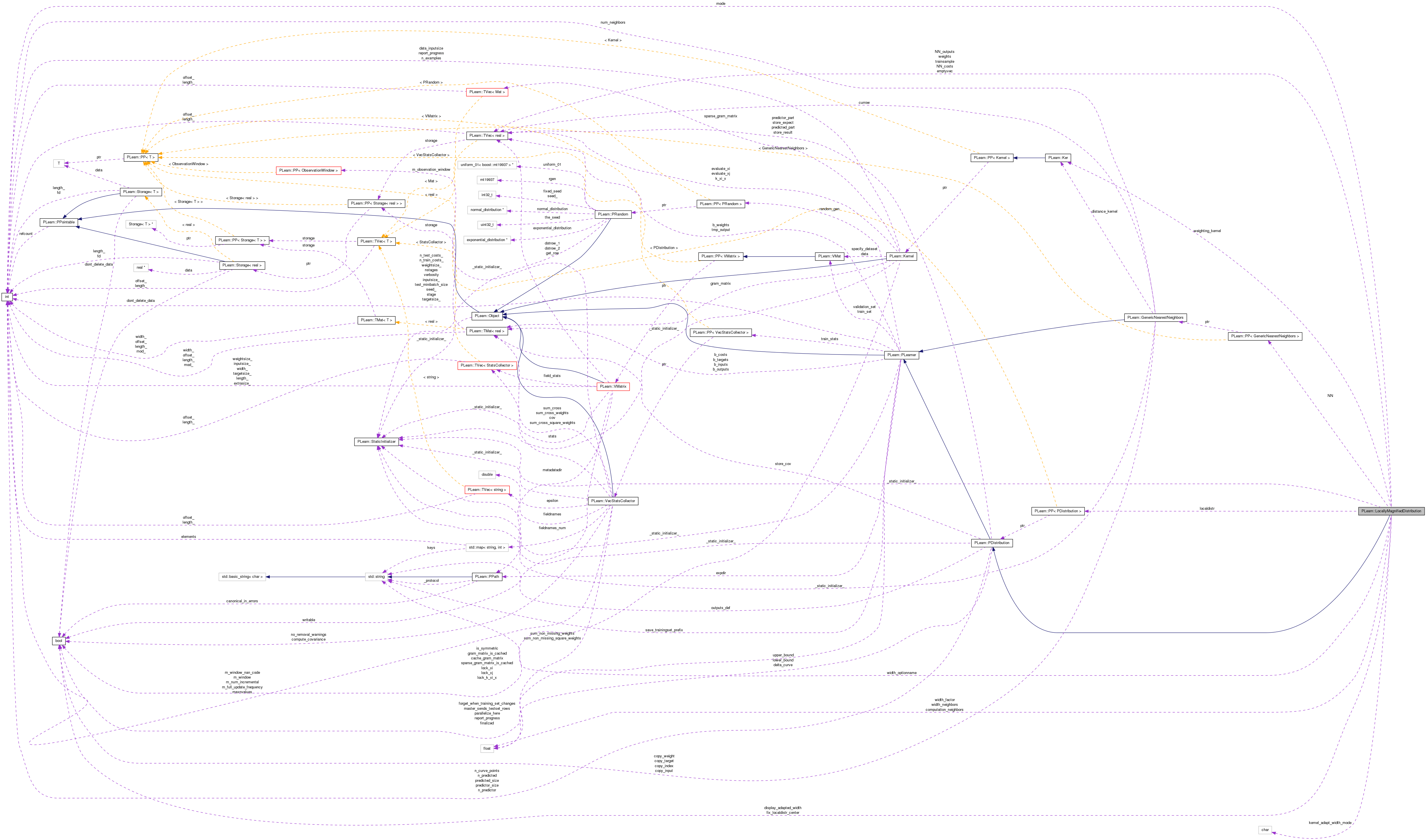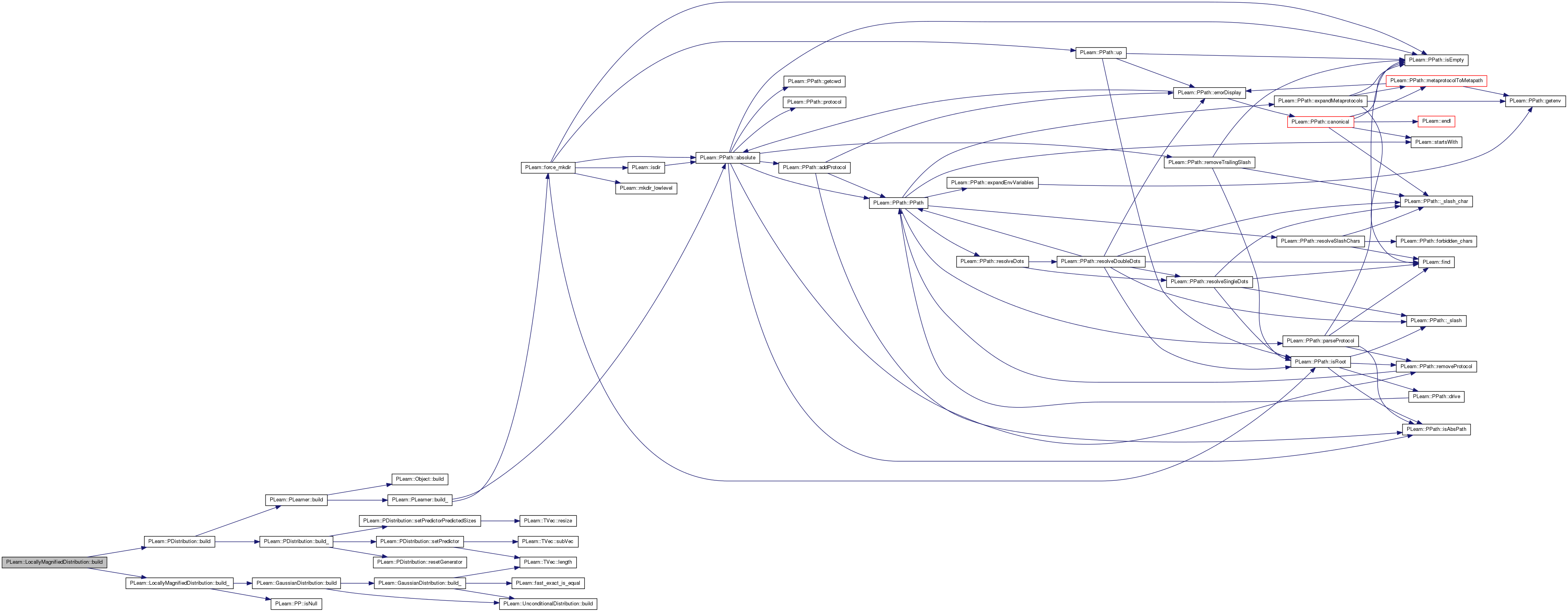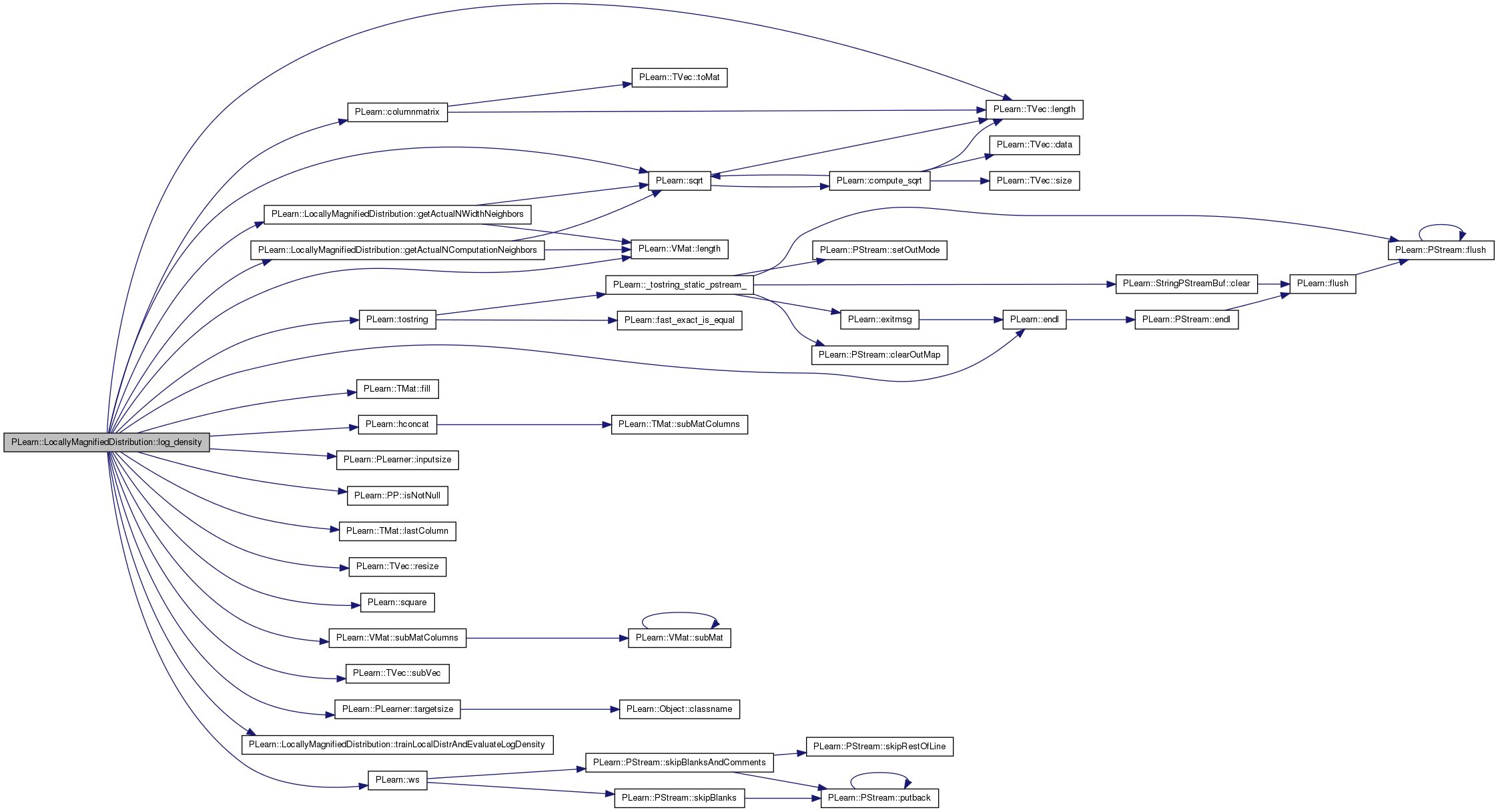|
PLearn 0.1
|
|
PLearn 0.1
|
#include <LocallyMagnifiedDistribution.h>


Public Member Functions | |
| LocallyMagnifiedDistribution () | |
| Default constructor. | |
| virtual void | build () |
| Simply call inherited::build() then build_(). | |
| virtual void | makeDeepCopyFromShallowCopy (CopiesMap &copies) |
| Transform a shallow copy into a deep copy. | |
| virtual string | classname () const |
| virtual OptionList & | getOptionList () const |
| virtual OptionMap & | getOptionMap () const |
| virtual RemoteMethodMap & | getRemoteMethodMap () const |
| virtual LocallyMagnifiedDistribution * | deepCopy (CopiesMap &copies) const |
| virtual real | log_density (const Vec &x) const |
| Return log of probability density log(p(y | x)). | |
| virtual void | train () |
| The role of the train method is to bring the learner up to stage == nstages, updating the train_stats collector with training costs measured on-line in the process. | |
| virtual void | forget () |
| (Re-)initializes the PLearner in its fresh state (that state may depend on the 'seed' option) And sets 'stage' back to 0 (this is the stage of a fresh learner!) | |
Static Public Member Functions | |
| static string | _classname_ () |
| static OptionList & | _getOptionList_ () |
| static RemoteMethodMap & | _getRemoteMethodMap_ () |
| static Object * | _new_instance_for_typemap_ () |
| static bool | _isa_ (const Object *o) |
| static void | _static_initialize_ () |
| static const PPath & | declaringFile () |
Public Attributes | |
| int | mode |
| real | computation_neighbors |
| Ker | weighting_kernel |
| char | kernel_adapt_width_mode |
| PP< PDistribution > | localdistr |
| The distribution that will be trained with local weights. | |
| bool | fix_localdistr_center |
| real | width_neighbors |
| real | width_factor |
| string | width_optionname |
Static Public Attributes | |
| static StaticInitializer | _static_initializer_ |
Protected Member Functions | |
| int | getActualNComputationNeighbors () const |
| int | getActualNWidthNeighbors () const |
| double | trainLocalDistrAndEvaluateLogDensity (VMat local_trainset, Vec y) const |
Static Protected Member Functions | |
| static void | declareOptions (OptionList &ol) |
| Declare this class' options. | |
Protected Attributes | |
| bool | display_adapted_width |
| Vec | emptyvec |
| Vec | NN_outputs |
| Vec | NN_costs |
| PP< GenericNearestNeighbors > | NN |
Private Types | |
| typedef PDistribution | inherited |
Private Member Functions | |
| void | build_ () |
| This does the actual building. | |
Private Attributes | |
| Vec | trainsample |
| Global storage to save memory allocations. | |
| Vec | weights |
Definition at line 53 of file LocallyMagnifiedDistribution.h.
typedef PDistribution PLearn::LocallyMagnifiedDistribution::inherited [private] |
Reimplemented from PLearn::PDistribution.
Definition at line 58 of file LocallyMagnifiedDistribution.h.
| PLearn::LocallyMagnifiedDistribution::LocallyMagnifiedDistribution | ( | ) |
Default constructor.
Definition at line 57 of file LocallyMagnifiedDistribution.cc.
:display_adapted_width(true), mode(0), computation_neighbors(-1), kernel_adapt_width_mode(' '), fix_localdistr_center(true), width_neighbors(1.0), width_factor(1.0), width_optionname("sigma") { }
| string PLearn::LocallyMagnifiedDistribution::_classname_ | ( | ) | [static] |
Reimplemented from PLearn::PDistribution.
Definition at line 72 of file LocallyMagnifiedDistribution.cc.
| OptionList & PLearn::LocallyMagnifiedDistribution::_getOptionList_ | ( | ) | [static] |
Reimplemented from PLearn::PDistribution.
Definition at line 72 of file LocallyMagnifiedDistribution.cc.
| RemoteMethodMap & PLearn::LocallyMagnifiedDistribution::_getRemoteMethodMap_ | ( | ) | [static] |
Reimplemented from PLearn::PDistribution.
Definition at line 72 of file LocallyMagnifiedDistribution.cc.
Reimplemented from PLearn::PDistribution.
Definition at line 72 of file LocallyMagnifiedDistribution.cc.
| Object * PLearn::LocallyMagnifiedDistribution::_new_instance_for_typemap_ | ( | ) | [static] |
Reimplemented from PLearn::PDistribution.
Definition at line 72 of file LocallyMagnifiedDistribution.cc.
| StaticInitializer LocallyMagnifiedDistribution::_static_initializer_ & PLearn::LocallyMagnifiedDistribution::_static_initialize_ | ( | ) | [static] |
Reimplemented from PLearn::PDistribution.
Definition at line 72 of file LocallyMagnifiedDistribution.cc.
| void PLearn::LocallyMagnifiedDistribution::build | ( | ) | [virtual] |
Simply call inherited::build() then build_().
Reimplemented from PLearn::PDistribution.
Definition at line 141 of file LocallyMagnifiedDistribution.cc.
References PLearn::PDistribution::build(), and build_().
{
// ### Nothing to add here, simply calls build_().
inherited::build();
build_();
}

| void PLearn::LocallyMagnifiedDistribution::build_ | ( | ) | [private] |
This does the actual building.
Reimplemented from PLearn::PDistribution.
Definition at line 151 of file LocallyMagnifiedDistribution.cc.
References PLearn::GaussianDistribution::build(), PLearn::GaussianDistribution::ignore_weights_below, PLearn::PP< T >::isNull(), and localdistr.
Referenced by build().
{
// ### This method should do the real building of the object,
// ### according to set 'options', in *any* situation.
// ### Typical situations include:
// ### - Initial building of an object from a few user-specified options
// ### - Building of a "reloaded" object: i.e. from the complete set of all serialised options.
// ### - Updating or "re-building" of an object after a few "tuning" options have been modified.
// ### You should assume that the parent class' build_() has already been called.
// ### If the distribution is conditional, you should finish build_() by:
// PDistribution::finishConditionalBuild();
if(localdistr.isNull())
{
GaussianDistribution* distr = new GaussianDistribution();
distr->ignore_weights_below = 1e-6;
distr->build();
localdistr = distr;
}
}


| string PLearn::LocallyMagnifiedDistribution::classname | ( | ) | const [virtual] |
Reimplemented from PLearn::PDistribution.
Definition at line 72 of file LocallyMagnifiedDistribution.cc.
| void PLearn::LocallyMagnifiedDistribution::declareOptions | ( | OptionList & | ol | ) | [static, protected] |
Declare this class' options.
Reimplemented from PLearn::PDistribution.
Definition at line 77 of file LocallyMagnifiedDistribution.cc.
References PLearn::OptionBase::buildoption, computation_neighbors, PLearn::declareOption(), PLearn::PDistribution::declareOptions(), fix_localdistr_center, kernel_adapt_width_mode, PLearn::OptionBase::learntoption, localdistr, mode, NN, PLearn::PLearner::train_set, weighting_kernel, width_factor, width_neighbors, and width_optionname.
{
// ### Declare all of this object's options here
// ### For the "flags" of each option, you should typically specify
// ### one of OptionBase::buildoption, OptionBase::learntoption or
// ### OptionBase::tuningoption. Another possible flag to be combined with
// ### is OptionBase::nosave
declareOption(ol, "mode", &LocallyMagnifiedDistribution::mode, OptionBase::buildoption,
"Output computation mode");
declareOption(ol, "computation_neighbors", &LocallyMagnifiedDistribution::computation_neighbors, OptionBase::buildoption,
"This indicates to how many neighbors we should restrict ourselves for the computations.\n"
"(it's equivalent to giving all other data points a weight of 0)\n"
"If <=0 we use all training points (with an appropriate weight).\n"
"If >1 we consider only that many neighbors of the test point;\n"
"If between 0 and 1, it's considered a coefficient by which to multiply\n"
"the square root of the numbder of training points, to yield the actual \n"
"number of computation neighbors used");
declareOption(ol, "weighting_kernel", &LocallyMagnifiedDistribution::weighting_kernel, OptionBase::buildoption,
"The magnifying kernel that will be used to locally weigh the samples.\n"
"If it is left null then all computation_neighbors will receive a weight of 1\n");
declareOption(ol, "kernel_adapt_width_mode", &LocallyMagnifiedDistribution::kernel_adapt_width_mode, OptionBase::buildoption,
"This controls how we adapt the width of the kernel to the local neighborhood of the test point.\n"
"' ' means leave width unchanged\n"
"'A' means set the width to width_factor times the average distance to the neighbors determined by width_neighborss.\n"
"'M' means set the width to width_faactor times the maximum distance to the neighbors determined by width_neighborss.\n");
declareOption(ol, "width_neighbors", &LocallyMagnifiedDistribution::width_neighbors, OptionBase::buildoption,
"width_neighbors tells how many neighbors to consider to determine the kernel width.\n"
"(see kernel_adapt_width_mode) \n"
"If width_neighbors>1 we consider that many neighbors.\n"
"If width_neighbors>=0 and <=1 it's considered a coefficient by which to multiply\n"
"the square root of the numbder of training points, to yield the actual \n"
"number of neighbors used");
declareOption(ol, "width_factor", &LocallyMagnifiedDistribution::width_factor, OptionBase::buildoption,
"Only used if width_neighbors>0 (see width_neighbors)");
declareOption(ol, "width_optionname", &LocallyMagnifiedDistribution::width_optionname, OptionBase::buildoption,
"Only used if kernel_adapt_width_mode!=' '. The name of the option in the weighting kernel that should be used to set or modifiy its width");
declareOption(ol, "localdistr", &LocallyMagnifiedDistribution::localdistr, OptionBase::buildoption,
"The kind of distribution that will be trained with local weights obtained from the magnifying kernel.\n"
"If left unspecified (null), it will be set to GaussianDistribution by default.");
declareOption(ol, "fix_localdistr_center", &LocallyMagnifiedDistribution::fix_localdistr_center, OptionBase::buildoption,
"If true, and localdistr is GaussianDistribution, then the mu of the localdistr will be forced to be the given test point.");
declareOption(ol, "train_set", &LocallyMagnifiedDistribution::train_set, OptionBase::learntoption,
"We need to store the training set, as this learner is memory-based...");
declareOption(ol, "NN", &LocallyMagnifiedDistribution::NN, OptionBase::learntoption,
"The nearest neighbor algorithm used to find nearest neighbors");
// Now call the parent class' declareOptions().
inherited::declareOptions(ol);
}

| static const PPath& PLearn::LocallyMagnifiedDistribution::declaringFile | ( | ) | [inline, static] |
Reimplemented from PLearn::PDistribution.
Definition at line 138 of file LocallyMagnifiedDistribution.h.
| LocallyMagnifiedDistribution * PLearn::LocallyMagnifiedDistribution::deepCopy | ( | CopiesMap & | copies | ) | const [virtual] |
Reimplemented from PLearn::PDistribution.
Definition at line 72 of file LocallyMagnifiedDistribution.cc.
| void PLearn::LocallyMagnifiedDistribution::forget | ( | ) | [virtual] |
(Re-)initializes the PLearner in its fresh state (that state may depend on the 'seed' option) And sets 'stage' back to 0 (this is the stage of a fresh learner!)
Reimplemented from PLearn::PDistribution.
Definition at line 389 of file LocallyMagnifiedDistribution.cc.
References PLearn::PP< T >::isNotNull(), and NN.

| int PLearn::LocallyMagnifiedDistribution::getActualNComputationNeighbors | ( | ) | const [protected] |
Definition at line 336 of file LocallyMagnifiedDistribution.cc.
References computation_neighbors, PLearn::VMat::length(), PLearn::sqrt(), and PLearn::PLearner::train_set.
Referenced by log_density(), and train().
{
if(computation_neighbors<=0)
return 0;
else if(computation_neighbors>1)
return int(computation_neighbors);
else
return int(computation_neighbors*sqrt(train_set->length()));
}


| int PLearn::LocallyMagnifiedDistribution::getActualNWidthNeighbors | ( | ) | const [protected] |
Definition at line 346 of file LocallyMagnifiedDistribution.cc.
References PLearn::VMat::length(), PLearn::sqrt(), PLearn::PLearner::train_set, and width_neighbors.
Referenced by log_density(), and train().
{
if(width_neighbors<0)
return 0;
else if(width_neighbors>1)
return int(width_neighbors);
return int(width_neighbors*sqrt(train_set->length()));
}


| OptionList & PLearn::LocallyMagnifiedDistribution::getOptionList | ( | ) | const [virtual] |
Reimplemented from PLearn::PDistribution.
Definition at line 72 of file LocallyMagnifiedDistribution.cc.
| OptionMap & PLearn::LocallyMagnifiedDistribution::getOptionMap | ( | ) | const [virtual] |
Reimplemented from PLearn::PDistribution.
Definition at line 72 of file LocallyMagnifiedDistribution.cc.
| RemoteMethodMap & PLearn::LocallyMagnifiedDistribution::getRemoteMethodMap | ( | ) | const [virtual] |
Reimplemented from PLearn::PDistribution.
Definition at line 72 of file LocallyMagnifiedDistribution.cc.
Return log of probability density log(p(y | x)).
Reimplemented from PLearn::PDistribution.
Definition at line 176 of file LocallyMagnifiedDistribution.cc.
References PLearn::columnmatrix(), display_adapted_width, emptyvec, PLearn::endl(), PLearn::TMat< T >::fill(), getActualNComputationNeighbors(), getActualNWidthNeighbors(), PLearn::hconcat(), i, PLearn::PLearner::inputsize(), PLearn::PP< T >::isNotNull(), kernel_adapt_width_mode, PLearn::TMat< T >::lastColumn(), PLearn::TVec< T >::length(), PLearn::VMat::length(), mode, n, NN, NN_costs, NN_outputs, PLearn::perr, pl_log, PLASSERT, PLERROR, PLearn::TVec< T >::resize(), PLearn::sqrt(), PLearn::square(), PLearn::VMat::subMatColumns(), PLearn::TVec< T >::subVec(), PLearn::PLearner::targetsize(), PLearn::tostring(), PLearn::PLearner::train_set, trainLocalDistrAndEvaluateLogDensity(), trainsample, w, weighting_kernel, weights, width_factor, width_optionname, and PLearn::ws().
{
int l = train_set.length();
int w = inputsize();
int ws = train_set->weightsize();
trainsample.resize(w+ws);
Vec input = trainsample.subVec(0,w);
PLASSERT(targetsize()==0);
int comp_n = getActualNComputationNeighbors();
int width_n = getActualNWidthNeighbors();
if(comp_n>0 || width_n>0)
NN->computeOutputAndCosts(y, emptyvec, NN_outputs, NN_costs);
if(kernel_adapt_width_mode!=' ')
{
real new_width = 0;
if(kernel_adapt_width_mode=='M')
{
new_width = width_factor*NN_costs[width_n-1];
// if(display_adapted_width)
// perr << "new_width=" << width_factor << " * NN_costs["<<width_n-1<<"] = "<< new_width << endl;
}
else if(kernel_adapt_width_mode=='Z')
{
new_width = width_factor*sqrt(square(NN_costs[width_n-1])/w);
}
else if(kernel_adapt_width_mode=='A')
{
for(int k=0; k<width_n; k++)
new_width += NN_costs[k];
new_width *= width_factor/width_n;
}
else
PLERROR("Invalid kernel_adapt_width_mode: %c",kernel_adapt_width_mode);
// hack to display only first adapted width
if(display_adapted_width)
{
/*
perr << "NN_outputs = " << NN_outputs << endl;
perr << "NN_costs = " << NN_costs << endl;
perr << "inutsize = " << w << endl;
perr << "length = " << l << endl;
*/
perr << "Adapted kernel width = " << new_width << endl;
display_adapted_width = false;
}
weighting_kernel->setOption(width_optionname,tostring(new_width));
weighting_kernel->build(); // rebuild to adapt to width change
}
double weightsum = 0;
VMat local_trainset;
if(comp_n>0) // we'll use only the neighbors
{
int n = NN_outputs.length();
Mat neighbors(n, w+1);
neighbors.lastColumn().fill(1.0); // default weight 1.0
for(int k=0; k<n; k++)
{
Vec neighbors_k = neighbors(k);
Vec neighbors_row = neighbors_k.subVec(0,w+ws);
Vec neighbors_input = neighbors_row.subVec(0,w);
train_set->getRow(int(NN_outputs[k]),neighbors_row);
real weight = 1.;
if(weighting_kernel.isNotNull())
weight = weighting_kernel(y,neighbors_input);
weightsum += weight;
neighbors_k[w] *= weight;
}
local_trainset = new MemoryVMatrix(neighbors);
local_trainset->defineSizes(w,0,1);
}
else // we'll use all the points
{
// 'weights' will contain the "localization" weights for the current test point.
weights.resize(l);
for(int i=0; i<l; i++)
{
train_set->getRow(i,trainsample);
real weight = 1.;
if(weighting_kernel.isNotNull())
weight = weighting_kernel(y,input);
if(ws==1)
weight *= trainsample[w];
weightsum += weight;
weights[i] = weight;
}
VMat weight_column(columnmatrix(weights));
if(ws==0) // append weight column
local_trainset = hconcat(train_set, weight_column);
else // replace last column by weight column
local_trainset = hconcat(train_set.subMatColumns(0,w), weight_column);
local_trainset->defineSizes(w,0,1);
}
// perr << "local_trainset =" << endl << local_trainset->toMat() << endl;
double log_local_p = 0;
switch(mode)
{
case 0:
log_local_p = trainLocalDistrAndEvaluateLogDensity(local_trainset, y);
return log_local_p + pl_log((double)weightsum) - pl_log((double)l) - pl_log((double)weighting_kernel(input,input));
case 1:
log_local_p = trainLocalDistrAndEvaluateLogDensity(local_trainset, y);
return log_local_p;
case 2:
return pl_log((double)weightsum) - pl_log((double)l);
case 3:
return pl_log((double)weightsum);
case 4:
log_local_p = trainLocalDistrAndEvaluateLogDensity(local_trainset, y);
return log_local_p+pl_log((double)width_n)-pl_log((double)l);
default:
PLERROR("Invalid mode %d", mode);
return 0;
}
}

| void PLearn::LocallyMagnifiedDistribution::makeDeepCopyFromShallowCopy | ( | CopiesMap & | copies | ) | [virtual] |
Transform a shallow copy into a deep copy.
Reimplemented from PLearn::PDistribution.
Definition at line 322 of file LocallyMagnifiedDistribution.cc.
References PLearn::deepCopyField(), localdistr, PLearn::PDistribution::makeDeepCopyFromShallowCopy(), NN, and weighting_kernel.
{
inherited::makeDeepCopyFromShallowCopy(copies);
// ### Call deepCopyField on all "pointer-like" fields
// ### that you wish to be deepCopied rather than
// ### shallow-copied.
// ### ex:
// deepCopyField(trainvec, copies);
deepCopyField(weighting_kernel, copies);
deepCopyField(localdistr, copies);
deepCopyField(NN, copies);
}

| void PLearn::LocallyMagnifiedDistribution::train | ( | ) | [virtual] |
The role of the train method is to bring the learner up to stage == nstages, updating the train_stats collector with training costs measured on-line in the process.
Reimplemented from PLearn::PDistribution.
Definition at line 360 of file LocallyMagnifiedDistribution.cc.
References getActualNComputationNeighbors(), getActualNWidthNeighbors(), PLearn::PP< T >::isNotNull(), PLearn::VMat::length(), PLearn::max(), PLearn::min(), NN, NN_costs, NN_outputs, PLearn::TVec< T >::resize(), and PLearn::PLearner::train_set.
{
int comp_n = getActualNComputationNeighbors();
int width_n = getActualNWidthNeighbors();
int actual_nneighbors = max(comp_n, width_n);
if(train_set.isNotNull())
actual_nneighbors = min(actual_nneighbors, train_set.length());
if(actual_nneighbors>0)
{
NN = new ExhaustiveNearestNeighbors(); // for now use Exhaustive search and default Euclidean distance
NN->num_neighbors = actual_nneighbors;
NN->copy_input = false;
NN->copy_target = false;
NN->copy_weight = false;
NN->copy_index = true;
NN->build();
if(train_set.isNotNull())
{
NN->setTrainingSet(train_set);
NN->train();
}
NN_outputs.resize(actual_nneighbors);
NN_costs.resize(actual_nneighbors);
}
}

| double PLearn::LocallyMagnifiedDistribution::trainLocalDistrAndEvaluateLogDensity | ( | VMat | local_trainset, |
| Vec | y | ||
| ) | const [protected] |
Definition at line 303 of file LocallyMagnifiedDistribution.cc.
References fix_localdistr_center, PLearn::GaussianDistribution::given_mu, and localdistr.
Referenced by log_density().
{
if(fix_localdistr_center)
{
GaussianDistribution* distr = dynamic_cast<GaussianDistribution*>((PDistribution*)localdistr);
if(distr!=0)
distr->given_mu = y;
}
localdistr->forget();
localdistr->setTrainingSet(local_trainset);
localdistr->train();
double log_local_p = localdistr->log_density(y);
return log_local_p;
}

Reimplemented from PLearn::PDistribution.
Definition at line 138 of file LocallyMagnifiedDistribution.h.
Definition at line 83 of file LocallyMagnifiedDistribution.h.
Referenced by declareOptions(), and getActualNComputationNeighbors().
bool PLearn::LocallyMagnifiedDistribution::display_adapted_width [mutable, protected] |
Definition at line 65 of file LocallyMagnifiedDistribution.h.
Referenced by log_density().
Vec PLearn::LocallyMagnifiedDistribution::emptyvec [protected] |
Definition at line 67 of file LocallyMagnifiedDistribution.h.
Referenced by log_density().
Definition at line 90 of file LocallyMagnifiedDistribution.h.
Referenced by declareOptions(), and trainLocalDistrAndEvaluateLogDensity().
Definition at line 86 of file LocallyMagnifiedDistribution.h.
Referenced by declareOptions(), and log_density().
The distribution that will be trained with local weights.
Definition at line 89 of file LocallyMagnifiedDistribution.h.
Referenced by build_(), declareOptions(), makeDeepCopyFromShallowCopy(), and trainLocalDistrAndEvaluateLogDensity().
Definition at line 82 of file LocallyMagnifiedDistribution.h.
Referenced by declareOptions(), and log_density().
Definition at line 75 of file LocallyMagnifiedDistribution.h.
Referenced by declareOptions(), forget(), log_density(), makeDeepCopyFromShallowCopy(), and train().
Vec PLearn::LocallyMagnifiedDistribution::NN_costs [mutable, protected] |
Definition at line 69 of file LocallyMagnifiedDistribution.h.
Referenced by log_density(), and train().
Vec PLearn::LocallyMagnifiedDistribution::NN_outputs [mutable, protected] |
Definition at line 68 of file LocallyMagnifiedDistribution.h.
Referenced by log_density(), and train().
Vec PLearn::LocallyMagnifiedDistribution::trainsample [mutable, private] |
Global storage to save memory allocations.
Definition at line 61 of file LocallyMagnifiedDistribution.h.
Referenced by log_density().
Definition at line 85 of file LocallyMagnifiedDistribution.h.
Referenced by declareOptions(), log_density(), and makeDeepCopyFromShallowCopy().
Vec PLearn::LocallyMagnifiedDistribution::weights [mutable, private] |
Definition at line 61 of file LocallyMagnifiedDistribution.h.
Referenced by log_density().
Definition at line 93 of file LocallyMagnifiedDistribution.h.
Referenced by declareOptions(), and log_density().
Definition at line 92 of file LocallyMagnifiedDistribution.h.
Referenced by declareOptions(), and getActualNWidthNeighbors().
Definition at line 94 of file LocallyMagnifiedDistribution.h.
Referenced by declareOptions(), and log_density().
 1.7.4
1.7.4